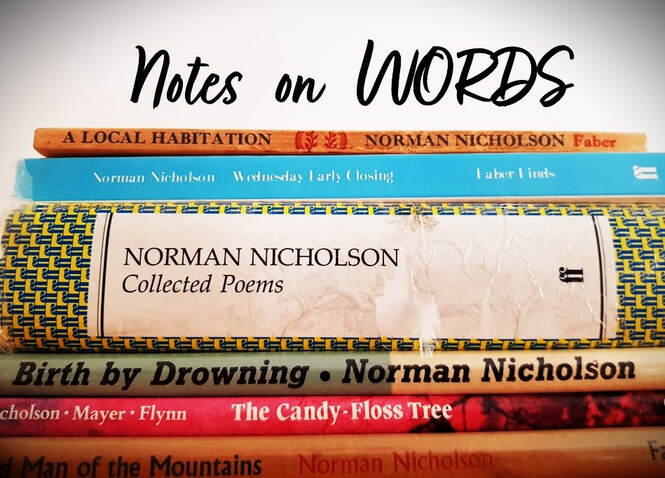Notes on Words is the successor to our feature Word of the Month which was a popular element of this website for some years. "Word of the Month" was a feature on the Norman Nicholson Society’s website from 2014 to 1018. Each entry, edited by Antoinette Fawcett, highlighted a distinctively local, or at least northern, word or phrase from Nicholson’s work, defining it for readers unfamiliar with it and discussing its significance in its context. Notes on Words is edited by Ann Thomson and picks up where Word of the Month left off but with a wider scope. Nicholson’s world is distant in time and place from many present-day readers. Cultural references his contemporaries would readily understand are no longer common currency. Social customs, childhood pastimes, work patterns, religious belief and practice, wartime disruptions … these are examples of elements that may now need unpacking.
 Ann Thomson. photo: JOHN TROLL
Ann Thomson. photo: JOHN TROLL
Ann will be pleased to welcome any contributions to Notes on Words. Could you offer a short article? Or would you like someone else to explain an allusion that seems obscure? If so, please contact Ann by email at [email protected]. The first 'Note' of the new series is written by Ann herself - see below.
Notes on Words starts with: 'As Trees Walking'
‘AS TREES WALKING’
(Collected Poems pp. 239-241, from The Pot Geranium, 1954)
As a committed Christian with a background first in Methodist church life and then in the
Church of England, Norman Nicholson was thoroughly versed in the Authorised (King
James) Version of the Bible. He drew on it for numerous poems and three of his plays (plus
the title of another), and it infused of much of his diction and imagery.
Although Scripture lessons and daily assemblies were routine in mid-20 th century English
schools, and many people had at least some experience of church or Sunday School, the
assumption that ‘everyone knew their Bible’ is shaky. Nicholson attained his considerable
biblical knowledge through personal commitment and study. This poem’s title may well have
seemed as enigmatic to some of his contemporaries as it does to many later readers whose
familiarity with the source is even more sketchy.
The quotation is from the New Testament Gospel of Mark, chapter 8, verses 22 to 26. All
four gospels relate incidents of Jesus giving or restoring sight to blind people. In this
particular story the man’s new-found vision is at first blurred and the people around him
appear ‘as trees walking’ (verse 24). Jesus intervenes again, enabling the man to see more
clearly.
Taking up the story where the evangelist leaves off, Nicholson imaginatively projects himself
into a maelstrom of unprecedented sensory experiences. The speaker’s first response is
bewilderment, even fear, so that he wonders: ‘What’s the gain to the seeing?’ The titular
image of walking trees prompts an exploration of multi-sensory confusion. The adjustment is
painful and demands patience. Only gradually, ‘day by month by year’, does he learn to
integrate sight into his relations with the world. The process mysteriously energises his
other senses, sparking new interplay between them, culminating in a dazzlingly kinaesthetic
effusion of joy, where every aspect of life is a new beginning.
The painful tactile detail of the man’s newly-sighted eyes feeling as if they ‘have the skin
scraped off them’ (‘As Trees Walking’, line 4) is absent from the gospel account, but may hint
obliquely at the story of Saul (later known as Paul) in the Acts of the Apostles. On the road
to Damascus, Saul is blinded by a vision that transforms him from arch-persecutor of the
fledgling Christian movement to its most powerful advocate. When he later recovers his
sight, it is as if scales had fallen from his eyes (Acts 9, verses 1 to 18). Seeing things afresh
- whether physically or metaphorically - is not without discomfort and challenge.
Nicholson’s adopted persona in this poem is informed by experience. His memoir
Wednesday Early Closing and his poem ‘The Whisperer’ (CP p. 267) vividly relate how TB
and doctors’ orders struck him dumb - a kind of sensory deprivation. ‘The Whisperer’
evokes with particular eloquence the pain of both loss and restoration. Isolated and unable
to communicate audibly for many months, he re-enters social situations only to be ‘stunned
and baffled’ by sensory overload and distorted perception. His physical struggle to be heard
mirrors the artist’s anxious search for ‘the undeadened brow that marks an undeafened /
Ear’. Nicholson said he wrote poetry to be heard, and enjoyed performing it. Once
reconciled to his restored power of speech, perhaps he felt as liberated as the newly-sighted
man for whom life is now ‘…seen, seen, seen, / In a new sense of a new sense’.
Ann Thomson, April 2024
‘AS TREES WALKING’
(Collected Poems pp. 239-241, from The Pot Geranium, 1954)
As a committed Christian with a background first in Methodist church life and then in the
Church of England, Norman Nicholson was thoroughly versed in the Authorised (King
James) Version of the Bible. He drew on it for numerous poems and three of his plays (plus
the title of another), and it infused of much of his diction and imagery.
Although Scripture lessons and daily assemblies were routine in mid-20 th century English
schools, and many people had at least some experience of church or Sunday School, the
assumption that ‘everyone knew their Bible’ is shaky. Nicholson attained his considerable
biblical knowledge through personal commitment and study. This poem’s title may well have
seemed as enigmatic to some of his contemporaries as it does to many later readers whose
familiarity with the source is even more sketchy.
The quotation is from the New Testament Gospel of Mark, chapter 8, verses 22 to 26. All
four gospels relate incidents of Jesus giving or restoring sight to blind people. In this
particular story the man’s new-found vision is at first blurred and the people around him
appear ‘as trees walking’ (verse 24). Jesus intervenes again, enabling the man to see more
clearly.
Taking up the story where the evangelist leaves off, Nicholson imaginatively projects himself
into a maelstrom of unprecedented sensory experiences. The speaker’s first response is
bewilderment, even fear, so that he wonders: ‘What’s the gain to the seeing?’ The titular
image of walking trees prompts an exploration of multi-sensory confusion. The adjustment is
painful and demands patience. Only gradually, ‘day by month by year’, does he learn to
integrate sight into his relations with the world. The process mysteriously energises his
other senses, sparking new interplay between them, culminating in a dazzlingly kinaesthetic
effusion of joy, where every aspect of life is a new beginning.
The painful tactile detail of the man’s newly-sighted eyes feeling as if they ‘have the skin
scraped off them’ (‘As Trees Walking’, line 4) is absent from the gospel account, but may hint
obliquely at the story of Saul (later known as Paul) in the Acts of the Apostles. On the road
to Damascus, Saul is blinded by a vision that transforms him from arch-persecutor of the
fledgling Christian movement to its most powerful advocate. When he later recovers his
sight, it is as if scales had fallen from his eyes (Acts 9, verses 1 to 18). Seeing things afresh
- whether physically or metaphorically - is not without discomfort and challenge.
Nicholson’s adopted persona in this poem is informed by experience. His memoir
Wednesday Early Closing and his poem ‘The Whisperer’ (CP p. 267) vividly relate how TB
and doctors’ orders struck him dumb - a kind of sensory deprivation. ‘The Whisperer’
evokes with particular eloquence the pain of both loss and restoration. Isolated and unable
to communicate audibly for many months, he re-enters social situations only to be ‘stunned
and baffled’ by sensory overload and distorted perception. His physical struggle to be heard
mirrors the artist’s anxious search for ‘the undeadened brow that marks an undeafened /
Ear’. Nicholson said he wrote poetry to be heard, and enjoyed performing it. Once
reconciled to his restored power of speech, perhaps he felt as liberated as the newly-sighted
man for whom life is now ‘…seen, seen, seen, / In a new sense of a new sense’.
Ann Thomson, April 2024
'Cumbrian phonetics cracked like a plaited whip'
|
Nicholson is by no means a dialect poet, but he does give his language and imagery a special Northern flavour in his choice of words. 'Word of the Month' took inspiration from the University of Glasgow’s Centre for Robert Burns Studies website, which for a time included a ‘Word of the Week’ article. Of course, much of Nicholson’s word-choice was completely standard – but there are enough words that might prove puzzling to the general reader without some kind of elucidation. And then, one might wish simply to explore and celebrate the Northern English energies in Nicholson’s opus – the Cumbrian phonetics which cracked like a plaited whip, as Seamus Heaney put it in a tribute poem written for Norman on the occasion of his 70th birthday.
|
August 2018........................
|
WORD OF THE MONTH ARCHIVE
July 2018....'brog' June 2018....'fratching' August 2017..'dub' April 2017.....'haemetite' January 2017..'lonning' July 2016.......'skerry' June 2016.......'lish' May 2016........'voe' January 2016....'unsnecked' December 2015..'backend' October 2015....'ghyll' August 2015.....'jammy crane' July 2015.........'syke' June 2015........'skear' May 2015..........'lass' March 2015........'stope' February 2015.....'glim' January 2015.......'spink' December 2014.....'mire' part 2 November 2014.....'mire, miry' October 2014....... 'neb' September 2014.... 'let' If you – or someone you know – might wish to contribute a short article for this column, please do contact us. We are not only interested in dialect – or near-dialect – usage, but also in a focus on any word which might, in the context of Nicholson’s poetry, drama or prose, contribute to its particularity, to a sense of Northerness… Click HERE for our contact details |





